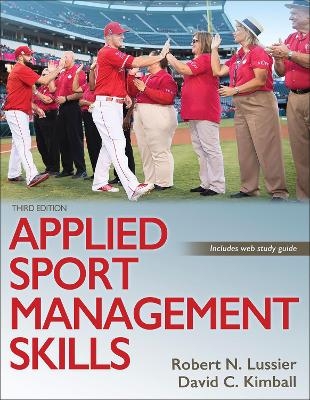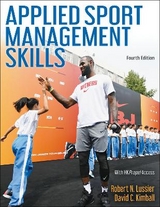
Applied Sport Management Skills
Human Kinetics (Verlag)
978-1-4925-7015-8 (ISBN)
- Titel erscheint in neuer Auflage
- Artikel merken
Applied Sport Management Skills, Third Edition With Web Study Guide, takes a unique and effective approach to teaching students how to become strong leaders and managers in the world of sport. Organized around the central management functions—planning, organizing, leading, and controlling—this third edition addresses the Common Professional Component topics outlined by the Commission on Sport Management Accreditation (COSMA).
The text explains important concepts but then takes the student beyond theories, to applying those management principles and developing management skills. This practical how-to approach, accompanied by unmatched learning tools, helps students put concepts into action as sport managers—developing the skills of creative problem solving and strategic planning, and developing the ability to lead, organize, and delegate.
Applied Sport Management Skills, Third Edition, has been heavily revised and touts a full-color format with 1,300 new references. Content updates keep pace with industry trends, including deeper discussions of legal liability, risk management and equipment management, servant leadership, sport culture, and social media. Particularly valuable are the special elements and practical applications that offer students real opportunities to develop their skills:
Features such as Reviewing Their Game Plan and Sport Management Professionals @ Work (new to this edition) provide a cohesive thread to keep students focused on how sport managers use the concepts on the job.
Applying the Concept and Time-Out sidebars offer opportunities for critical thinking by having the student think about how specific concepts relate to a sport situation or to the student’s actual experiences in sports, including part-time jobs, full-time jobs, internships, and volunteer work.
Self-Assessment exercises offer insight into students’ strengths and weaknesses and how to address shortcomings.
An enhanced web study guide is integrated with the text to facilitate a more interactive setting with which to complete many of the learning activities. Several of the exercises require students to visit a sport organization and answer questions to gain a better understanding of sport management.
Skill-Builder Exercises present a variety of scenarios and provide step-by-step guidance on handling day-to-day situations such as setting priorities, conducting job interviews, handling conflict, and coaching employees to better performance.
Sports and Social Media Exercises offer Internet-based activities that expose students to the role of social media in managing a sport organization. Students are required to use popular social media sites such as Facebook, Twitter, and LinkedIn and visit sport websites.
Game Plan for Starting a Sport Business cases put students in the driver’s seat and ask them to perform managerial activities such as developing an organization structure and formulating ideas on how to lead their employees.
The web study guide allows students to complete most of the learning activities online or download them and then submit them to the instructor. Instructors will also have access to a suite of ancillaries: an instructor guide, test package, and presentation package.
Applied Sport Management Skills, Third Edition, is a critical resource that provides students with a thorough understanding of the management principles used in sport organizations while also helping students developing their practical skills. Students will appreciate the opportunity to begin building a solid foundation for a fulfilling career in sport management.
Robert N. Lussier, PhD, is a professor of management at the birthplace of basketball, Springfield College, where more than one-third of the students compete in 27 intercollegiate athletic teams. He has taught undergraduate and graduate sport management students for more than 30 years. He has also supervised sport internships and serves as an advisor for sport management research projects. Lussier was an intercollegiate cross country and track athlete and has coached at the college, high school, and youth levels. He is a prolific writer with more than 444 publications, including articles in top refereed journals. Over one million people globally have used his textbooks, earning him an unsurpassed national and international reputation as an author and keynote speaker. David C. Kimball, PhD, is a professor of management and the director of the sport management program at Elms College. He teaches sport management and sport marketing courses. As coordinator of the sport management internship program, he has placed many students in internships that offer real-world experience. Kimball has helped develop and promote sporting events for organizations such as Junior Achievement and the JCC Maccabi Games, and he coaches and supervises Maccabi athletes each summer. He has an expansive network of friends and acquaintances in the sport management field; many of the case studies in this book arose from these relationships.
Part I. Introduction to Sport Management
Chapter 1. Managing Sports
The Sport Industry
What Is Sport Management?
What Does It Take to Be a Successful Manager?
What Do Sport Managers Do?
How Do Managers Differ?
Chapter 2. The Sport Industry Environment
Internal Environment and Quality in Sport
External Environment and Risk Management
Conducting Sport Business in a Global Environment
Ethics in Sport Management
Social Responsibility and Sustainability
Part II. Planning
Chapter 3. Creative Problem Solving and Decision Making
An Overview of Problem Solving and Decision Making
Step 1: Define the Problem or Opportunity
Step 2: Set Objectives and Criteria
Step 3: Generate Alternatives
Step 4: Select the Most Feasible Alternative
Step 5: Implement the Decision
Step 6: Control the Results
Chapter 4. Strategic and Operational Planning
An Overview of Strategic and Operational Planning
Strategic Process
Analysis of the Environment
Setting of Objectives
Corporate-Level Strategy
Business-Level Strategy
Functional-Level Strategies
Implementing and Controlling the Strategies
Part III. Organizing
Chapter 5. Organizing and Delegating Work
The Organizing Function
Authority
Organizational Design
Job Design
Organizing Yourself and Delegating Work
Chapter 6. Sport Culture, Innovation, and Diversity
Managing Change
Organizational Culture
Innovation, Quality, and the Learning Organization
Diversity
Organizational Development
Chapter 7. Human Resources Management
Human Resources Management Process and Department
Legal Environment
Human Resources Planning and Job Analysis
Attracting Employees
Interviewing
Developing Employees
Performance Appraisals
Retaining Employees
Part IV. Leading
Chapter 8. Behavior in Organizations
Organizational Behavior
Personality
Perception
Attitudes
Power
Politics in the Office and on the Field
Managing Conflict
Negotiation
Collaboration
Stress
Chapter 9. Team Development
Importance of Teamwork to Performance
Group Performance Model
Group Structure
Group Process
Stages of Group Development and Leadership Styles
Developing Groups Into Teams
Getting to Better Meetings
Chapter 10. Communicating for Results
Understanding the Importance of Good Communication
Using Organizational Communication
Using Interpersonal Communication
Using the Channels
Sending Messages
Receiving Messages
Responding to Messages
Dealing With Emotions and Criticism
Chapter 11. Motivating to Win
Motivation and Performance
Content Motivation Theories
Process Motivation Theories
Reinforcement Theory
Putting Theory to Work Within the Motivational Process and Motivating Yourself
Chapter 12. Leading to Victory
Leadership and Traits
Behavior of Effective Leaders
Contemporary Perspectives
Situational Leadership Theories and Models
Getting to Your Personal Style of Leadership
Part V. Controlling
Chapter 13. Controlling Quality, Financials, Productivity and Managing People
Quality and Control Systems
Control Process
Frequency of Controls
Financial Controls
Managing People
Managing Problem Employees
Productivity
Chapter 14. Facilities and Events Management
Sport Facilities and Event Management
Sport Facilities Management
Sport Event Management
Planning and Controlling Sports
Sales Forecasting Techniques
Scheduling Tools
Time Management
| Erscheinungsdatum | 29.05.2019 |
|---|---|
| Verlagsort | Champaign, IL |
| Sprache | englisch |
| Maße | 216 x 279 mm |
| Gewicht | 1451 g |
| Themenwelt | Sachbuch/Ratgeber ► Sport |
| ISBN-10 | 1-4925-7015-X / 149257015X |
| ISBN-13 | 978-1-4925-7015-8 / 9781492570158 |
| Zustand | Neuware |
| Haben Sie eine Frage zum Produkt? |
aus dem Bereich



